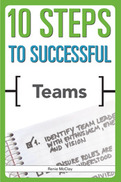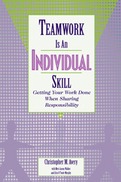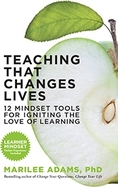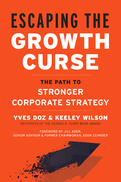Offers accessible, practical advice for getting past barriers to team success
Focuses on both team members and team leaders
Features a wealth of assessments and tools to help implement the steps and chart progress along the way
Most projects or initiatives in today’s organizations begin with the formation of a team. Indeed, the global nature of doing business today demands that people perform well together as cross-functional and cross-cultural teams. Teams need to be able to connect quickly, determine what needs to be done, identify obstacles and overcome them, and meet deadlines and goals. Positive collaboration is essential. Yet the majority of resources available for this core business activity are long on description and short on implementation.
You’ll find this missing practical, east-to-implement advice in 10 Steps to Successful Teams. Using a holistic, process-oriented approach, this book carefully guides readers through building strong new teams and improving even the best existing ones. The straightforward, accessible steps can be followed in sequence, or you can go directly to the step that addresses your particular, immediate need. Renie McClay includes extensive assessments and tools created just for this book to help identify roles on the team, improve communication, track progress, encourage creativity, work virtually, deal with problems, celebrate success, and more. You will find individual team member and leader self-assessments to help focus the team on getting results and identify areas for improvement.
This book was written for both team leaders and team members. Each of the ten steps has content and specific tips for both audiences. This is no accident. Being a great team member plays just as important a role in the success of any team effort as being a great leader. This book can be used by individuals on a team or by the entire team as a developmental tool.
An effective team can unleash a collective intelligence and energy that is far more than the sum of its parts. McClay’s 10 Steps to Successful Teams is a concise, instantly actionable guide that can help any organization reap the powerful benefits of effective, engaged teamwork.
Offers accessible, practical advice for getting past barriers to team success
Focuses on both team members and team leaders
Features a wealth of assessments and tools to help implement the steps and chart progress along the way
Most projects or initiatives in today s organizations begin with the formation of a team. Indeed, the global nature of doing business today demands that people perform well together as cross-functional and cross-cultural teams. Teams need to be able to connect quickly, determine what needs to be done, identify obstacles and overcome them, and meet deadlines and goals. Positive collaboration is essential. Yet the majority of resources available for this core business activity are long on description and short on implementation.
You ll find this missing practical, east-to-implement advice in 10 Steps to Successful Teams. Using a holistic, process-oriented approach, this book carefully guides readers through building strong new teams and improving even the best existing ones. The straightforward, accessible steps can be followed in sequence, or you can go directly to the step that addresses your particular, immediate need. Renie McClay includes extensive assessments and tools created just for this book to help identify roles on the team, improve communication, track progress, encourage creativity, work virtually, deal with problems, celebrate success, and more. You will find individual team member and leader self-assessments to help focus the team on getting results and identify areas for improvement.
This book was written for both team leaders and team members. Each of the ten steps has content and specific tips for both audiences. This is no accident. Being a great team member plays just as important a role in the success of any team effort as being a great leader. This book can be used by individuals on a team or by the entire team as a developmental tool.
An effective team can unleash a collective intelligence and energy that is far more than the sum of its parts. McClay s 10 Steps to Successful Teams is a concise, instantly actionable guide that can help any organization reap the powerful benefits of effective, engaged teamwork.
- The first book to identify the individual-rather than group-behavior skills vital to every team's success
- Offers specific strategies followed by application exercises to help readers be powerful and thrive in teams, partnerships, and collaborations
- Reveals step by step how readers can be achieve outstanding business results through building responsible, effective, and productive relationships at work
Teaching That Changes Lives is a transformational and practical guide that will enable teachers to make an authentic difference with their students and avoid succumbing to the myriad pressures and challenges of their jobs.
Using the storytelling format that proved so successful in her previous book, Adams tells how Emma, a sixth-grade teacher on the verge of quitting her job, learns to cultivate what Adams calls the “Learner Mindset”— having the discipline, curiosity, and courage to consistently ask growth-oriented, open-minded questions of oneself and others—and to avoid the close-minded and critical “Judger Mindset.” Emma transforms her classroom, her relationships with her colleagues, and, most importantly, her students' eagerness for learning and achievement.
Teaching is more than imparting facts and skills—it's preparing students for the test of life. Featuring an innovative, easy-to-follow workbook and access to a Learner Mindset online mini-course, this inspiring book will ensure that teachers and students alike become creative, resilient problem solvers, bridge builders, and lifelong learners.
2025
Drawing from decades of work with global organizations, military commanders, and NASA leaders, Jeff and Staney DeGraff reveal how true transformation emerges not from avoiding contradictions, but from embracing them.
This groundbreaking book, the third installation in their comprehensive innovation series, introduces a revolutionary framework for understanding and leveraging paradox. Through rich storytelling and battle-tested strategies, the DeGraffs unpack seven fundamental contradictions that define transformative growth:
How do we achieve more by doing less? Why does certainty often lead to failure, while embracing uncertainty paves the path to breakthrough? When does resistance become the catalyst for change? The Art of Change demonstrates how these seeming contradictions hold the key to profound transformation—both personally and professionally.
This isn't just another business book—it's a practical philosophy for navigating complexity in dynamic environments. Whether you're leading a Fortune 500 company, steering a non-profit through turbulent times, or seeking personal growth, you'll discover:
- A proven framework for turning obstacles into opportunities
- Practical tools for making better decisions in ambiguous situations
- Strategies for building resilience through embracing paradox
- Methods for driving innovation by challenging conventional wisdom
- Techniques for leading transformational change in any environment
Don't just manage change—master it. Learn how to transform paradoxes into breakthroughs and turn uncertainty into your greatest advantage. The Art of Change is your essential guide to navigating the contradictions that define our era and achieving lasting transformation in an increasingly fluid world.
As companies mature, their underlying growth naturally slows—this is called the 'growth curse'. It's a pervasive problem that plagues companies, CEOs, and board members alike. In order to safeguard a company's future, a strategic form of governance in which the board plays a more active role on behalf of all stakeholders, must be activated.
This book is comprised of 3 parts. First it shows companies how to identify the traditional traps that hinder growth. The second part provides companies with a blueprint for building their board, defining long-term strategy, and adjustments necessary to serve continued growth. The final part delves into the specific ways that the board and executives must collaborate in relation to strategic renewal.
Reimagining the limits of growth and how companies are run as a consequence provides an escape from the 'growth curse' at last.
It's time to throw out the old rules of influence and become the leader you've always wanted to be.
A new type of leader is emerging—one with a bold mission who empowers others through transparency and unwavering passion. Modern-day executive presence mandates levels of authenticity and honesty never before seen in the C-suite.
Personal branding and reputation management expert, Lida Citroën guides leaders through this new paradigm of executive presence and influence. Through inspiring examples, compelling stories, and practical exercises, Citroën helps leaders tap into their passion, connect authentically with others, and create space for inclusivity and community.
Greta Thunberg is a powerful example of a new paradigm leader. The Swedish teenager's influence arguably exceeds that of most CEOs or political leaders. The youngest person to be named Time's Person of the Year, she radically upended Swedish politics and world climate policy. Nothing about her conforms to the typical expectations of a leader's executive presence—her power comes from her absolute honesty and genuine passion to make the world a better place.



















